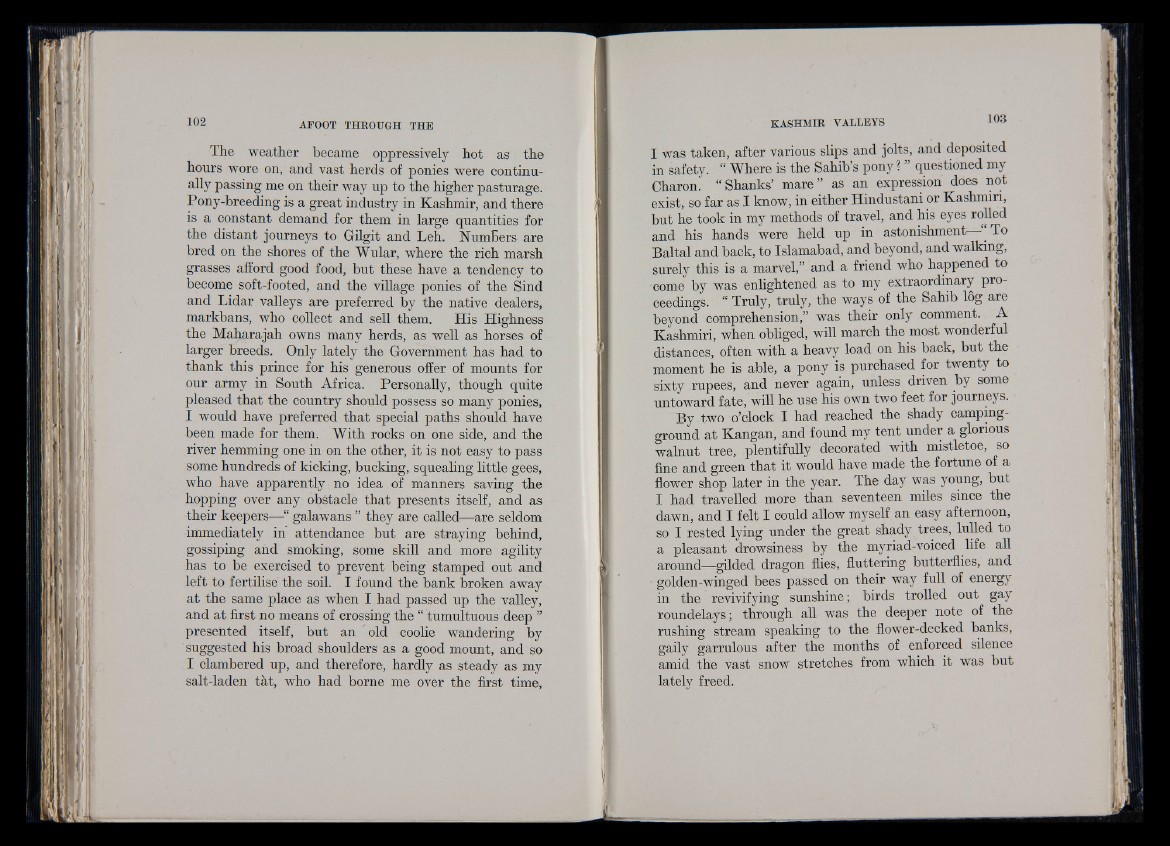
The weather became oppressively hot as the
hours wore on, and vast herds of ponies were continually
passing me on their way up to the higher pasturage.
Pony-breeding is a great industry in Kashmir, and there
is a constant demand for them in large quantities for
the distant journeys to Gilgit and Leh. Numbers are
bred on the shores of the Wular, where the rich marsh
grasses afford good food, but these have a tendency to
become soft-footed, and the village ponies of the Sind
and Lidar valleys are preferred by the native dealers,
markbans, who collect and sell them. His Highness
the Maharajah owns many herds, as well as horses of
larger breeds. Only lately the Government has had to
thank this prince for his generous offer of mounts for
our army in South Africa. Personally, though quite
pleased that the country should possess so many ponies,
I would have preferred that special paths should have
been made for them. With rocks on one side, and the
river hemming one in on the other, it is not easy to pass
some hundreds of kicking, bucking, squealing little gees,
who have apparently no idea of manners saving the
hopping over any obstacle that presents itself, and as
their keepers—“ galawans ” they are called—are seldom
immediately in attendance but are straying behind,
gossiping and smoking, some skill and more agility
has to be exercised to prevent being stamped out and
left to fertilise the soil. I found the bank broken away
at the same place as when I had passed up the valley,
and at first no means of crossing the “ tumultuous deep ”
presented itself, but an old coolie wandering by
suggested his broad shoulders as a good mount, and so
I clambered up, and therefore, hardly as steady as my
salt-laden tat, who had borne me over the first time,
I was taken, after various slips and jolts, and deposited
in safety. “ Where is the Sahib s pony ? questioned my
Charon. “ Shanks’ mare ” as an expression does not
exist, so far as I know, in either Hindustani or Kashmiri,
but he took in my methods of travel, and his eyes rolled
and his hands were held up in astonishment—. To
Baltal and back, to Islamabad, and beyond, and walking,
surely this is a marvel,” and a friend who happened to
come by was enlightened as to my extraordinary proceedings.
“ Truly, truly, the ways of the Sahib log are
beyond comprehension,” was their only comment. A
Kashmiri, when obliged, will march the most wonderful
distances, often with a heavy load on his back, but the
moment he is able, a pony is purchased for twenty to
sixty rupees, and never again, unless driven by some
untoward fate, will he use his own two feet for journeys.
By two o’clock I had reached the shady camping-
ground at Kangan, and found my tent under a glorious
walnut tree, plentifully decorated with mistletoe, so
fine and green that it would have made the fortune of a
flower shop later in the year. The day was young, but
I had travelled more than seventeen miles since the
dawn, and I felt I could allow myself an easy afternoon,
so I rested lying under the great shady trees, lulled to
a pleasant drowsiness by the myriad-voiced life all
around—gilded dragon flies, fluttering butterflies, and
golden-winged bees passed on their way full of energy
in the revivifying sunshine; birds trolled out gay
roundelays; through all was the deeper note of the
rushing stream speaking to the flower-decked banks,
gaily garrulous after the months of enforced silence
amid the vast snow stretches from which it was but
lately freed.